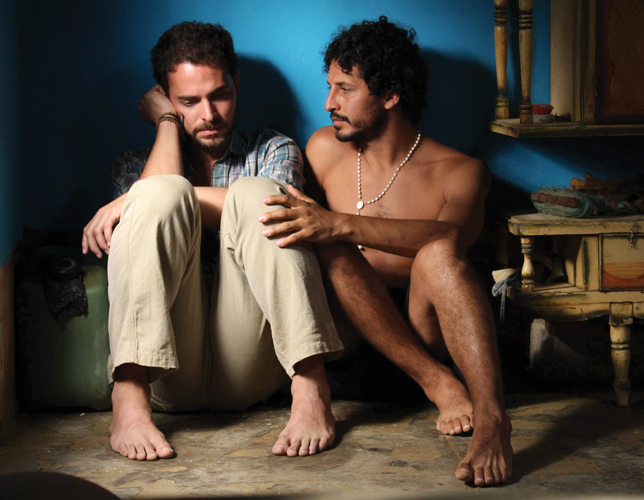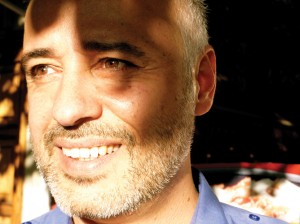Two Guys
An interview with gay filmmaker Javier Fuentes-Leon
by Gregg Shapiro
Undertow/Contracorriente (Wolfe), the feature film debut by gay writer/director Javier Fuentes-Leon, is a deeply moving romantic love story, with a ghost-story twist that will stir up an ocean of emotions in viewers. Fisherman Miguel (Cristian Mercado) and his wife, Mariela (Tatiana Astengo), are anticipating the birth of their first child. A well-respected man in his village, Miguel is also carrying on a romantic relationship with gay artist Santiago (Manolo Cardona). Macho Miguel is unable to choose one over the other, but Santiago’s death and reappearance as a ghost that only he can see has an unexpected impact on his life.
OutSmart spoke with Fuentes-Leon shortly before his film was released on Blu-ray and DVD.
Gregg Shapiro: Before Undertow, you made a couple of short films. What was it about Undertow that made you want to turn it into your feature length debut?
Javier Fuentes-Leon: The seed for Undertow comes from an exercise in class when I was studying film at Cal Arts here in L.A. I was taking a screenwriting class and they told us to write a scene. They gave us a few conditions, like no more than three characters, one location, and try to create conflict between them. I wrote a scene right there in class that, with a few changes, is pretty much the scene in the kitchen where the fisherman walks in, finds the lover, and starts to freak out, and the wife wakes up, and then he realizes that she cannot see him [the lover].
I wrote that not thinking of it becoming anything else but an exercise at that moment. But it stayed with me, and based on that I wrote a play called Mariela’s Kitchen, because it all took place in the kitchen. Then I wrote a short film based on that play that somebody else directed as their thesis film. And this is all in ’96, ’97, ’99, and then it was in 2001 that I thought the story could be more and could become a feature film.
Now the main difference from all the previous versions was that, in the meantime, I was in my own process of coming out. So previously the love triangle had been between a fisherman, his wife, and the prostitute of the town, who was another woman. That’s how I wrote that first scene for the screenwriting class and the play and that short film that somebody else directed. It was more of a revenge story, like the ghost was more like a wronged woman who was coming back to make the fisherman’s life hell.
So it was scarier? Less romantic?
But it was when I was in my own process of coming out that I decided, “Okay let’s be real here and let’s make this what it should really be,” which is a love triangle between a fisherman and his wife and another man. Not only did it become more personal as a film, but it also became, I thought, better drama. Because in a town like this one for a man that is married to have an affair with another woman is not unheard of—it’s actually quite common, and maybe his other friends would think he’s cool for doing that. Whereas having an affair with another man is really a bad thing.
You mentioned your coming out process, and since you wrote the screenplay, how much of Javier is in Santiago and Miguel?
I think there’s a lot. This is definitely not an autobiographical story. I am from Peru, but I’m from the city Lima, which is right next to the ocean. So I grew up with the ocean close to me, but I was never a fisherman. I never had somebody that I was in love with drown, so it’s not my story at all. I wasn’t married and about to be a father.
But I definitely relate a lot to the fear and the journey of Miguel. The fear of accepting himself, of looking at himself in the mirror and saying, “You are gay. I am gay.” And also, the fear of being found out by other people.
I was also raised in a Catholic environment. I went to a Catholic school, a Catholic family. My family is not fanatic Catholic; they are believers, but they are not blinded by faith either. But it was around me a lot. I think that everywhere, but especially in America, religion has definitely shaped our views of sexuality, and not only homosexuality, but sexuality in general.
I’m glad you mentioned the religious aspect, because there is a degree of the “down-low” aspect of that relationship in Undertow. Would you say that religion plays a strong role in that particular “down-low” culture in Peru as well as in other places?
Yeah. As I said, I think that religion has shaped our view of sex and what is right and what is wrong, and when sex is right. In terms of religion, sex is only right when it leads to procreation. So everything else that doesn’t lead to procreation is a sin, at least in Catholicism. That’s why masturbation is a sin, contraceptives are a sin, and definitely homosexuality. But even sex within a marriage that doesn’t lead to procreation is not good. Maybe it’s changed a little, but that’s how sex was viewed for the longest time.
I think that has defined our view of sexuality. So in societies where religion is very present, even people that are not religious, or come from families that are less religious, it’s still defined society. And in Catholicism, you hide your secrets, whatever you feel that society is not going to approve. So there’s a big “down-low,” as you say, in terms of gay people definitely. It’s coming out more and it’s good. But people in my generation and the generation of my parents—especially my parents—they had it way harder than I did, and my generation had it harder than my nephew’s generation, who is 21.
Miguel talks about “being on good terms with God.” How do you think he justifies his dual life?
That’s a good question. I don’t know if he justifies it. I don’t know if he sits down to think about it. I think he’d just rather not put a lot of thought into it, and that’s why when Santiago calls him on his bullshit he gets really mad. That’s when he says, “I’m not like that.” Somehow he’s compartmentalized the feelings that he has for Santiago, and as this thing that he’d rather not have but unfortunately has, and therefore he acts on it. He feels that probably God will forgive him because he’s actually a good member of his society, a good father-to-be, a good husband.
When you live in hiding, there’s a little bit of a schizophrenic psychology going on in which you separate the person that you show to the public with the person that you really are or that you hide. I relate to that. One of the horrible things about hiding who you really are is this divided personality and this act that you show a part of who you are, the part that you think people want to see. And you fall in love with that part sometimes, and that’s why it’s so hard to come out and say “I am gay” sometimes because you’ve created, consciously and unconsciously, an image of yourself, for yourself and for the rest, and when you come out you basically have to bring down that image and with the same bricks create another one that is really closer to who you are.
Very well said. There’s also this really subtle humor in the movie, especially in some of the scenes between Santiago and Miguel. Was it important for you to have that?
Yeah, and I’m glad that it came through. When some people read the script, they said, “Wow, this is heavy.” It is heavy, it’s melodramatic, the emotions are intense, and I’m not denying that that was part of the process. I love melodramas, melodramas from the ’50s, so I’m fine with the melodrama, but I feel that it needed some balance, some sense of humor. And that’s why I wrote scenes like the poker scene. By having a ghost, you have the potential to create some funny moments.
I’m glad you mentioned the poker scene, because Undertow is ultimately a ghost story, and if you don’t mind my saying so, it reminded me a bit of the 1990 Patrick Swayze/Demi Moore movie Ghost. Would you say that that movie was an influence?
Actually no. I knew that it is one of the most popular movies around, especially made by Hollywood, that shows a love story with a ghost. I would say that more of an influence was Doña Flor and Her Two Husbands. That’s a Brazilian film based on a novel, and this woman that has an alive husband and one that is dead who comes back to alleviate her a little of the boredom that she’s in. The older lady, who plays the character of the aunt [in Undertow], her name is Doña Flor, and that is a direct homage to that movie. It’s not that I wrote that scene or the play afterwards or even Undertow thinking of Doña Flor and Her Two Husbands and being inspired by it, and thinking that I wanted to write something similar. I just realized when I was writing Undertow that there are some similarities in terms of dimensions and all that with Doña Flor and Two Husbands. But I also saw Truly, Madly, Deeply and The Ghost and Mrs. Muir—there are a lot of films. There are some points in common, but none of them were a template.
There’s sort of this strong sense of homophobia of the people in the village. Do you think that a movie such as Undertow has the power to change people’s perspective on the subject of gay life?
I would hope so. I think it’s touched people, some much more than others. We’ve had some people come to us and say, “I would never have come to see this movie, but my girlfriend dragged me, and you had me crying.” I think out of the 44 awards that we’ve had for this film, half have come from audiences. And not only audiences in gay film festivals. Whether it was Sundance or Cartagena or Miami or Utrecht in the Netherlands, it’s been received by all kinds audiences, which is great.
So I think people have been surprised to connect to a love story between these two men and also of the fisherman and his wife. For me it’s really a love triangle—it’s not just a love story between two men. But I think that it maybe contributes to the conversation and maybe to humanize [gay people] for people who just see homosexuality as just… because a lot people that don’t have any connections to gay people or are not really surrounded by gay people, when they think about homosexuality, they immediately just go to the sexual act. That becomes a wall that they cannot get past, and [they cannot] see that behind sexual orientation there actually is a whole human being that falls in love and has all the same human feelings and emotions that they do. So, if a film like mine can open and can humanize a love story between two men, I think that’s great. I think that in some ways it has contributed.
But in all honesty, what really is going to make a change, it’s not film. It’s got to be people coming out, and people around them having to deal with the fact that now they have somebody who they love that is telling them, “I am gay and I am happy being gay.” Because it puts them in a crisis, like a dilemma. They have to choose between opening up their mind and getting to know this person who they love and already thought they knew in a way, or shutting them out of their life because they stick to their morals. I think that is really what will make a change. Film can help, art can help, but it’s people coming out that will make the change.
Have you begun work on your next film project?
I have three projects in development, but two are already written as screenplays. The one that is a little more advanced is a love story, once again, with magical elements. This time it’s between a man and a woman, a woman who cannot go into the sunlight because she bursts into flames when she comes into contact with the sun. She’s not a vampire, but she has that aspect. The story starts when this human cannonball guy, who gets shot out of a cannon, crashes into her roof. She lives in the forest in the middle of nowhere, alone, and she’s never really had any contact with other people. So the movie really starts when he crashes in her roof and creates a huge hole two hours before sunrise. So it’s this love story that starts really antagonistically, and slowly through them falling in love she’s able to go into the sunlight. So it’s kind of like a metaphor for coming out again. The woman that is hidden in the darkness is able to come out to the sunlight. But there are no gay characters per se, but it’s definitely a gay sensibility, I would say.
Gregg Shapiro is a regular contributor to OutSmart magazine.











Comments